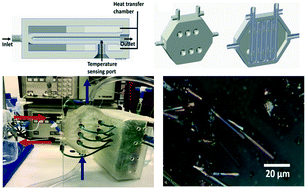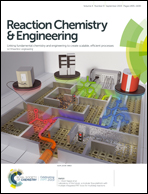Continuous-flow crystallisation in 3D-printed compact devices†
Abstract
A flexible and cost-effective methodology to develop compact flow devices with heat exchange ability is presented here. Additive manufacturing techniques allow the rapid design and manufacture of modular jacketed flow devices, where heat exchange can be modelled and controlled to generate efficient devices for applications in continuous-flow cooling crystallisation. As a proof of concept, the crystallisation of paracetamol has been demonstrated. The manufactured devices are effective in crystallising form II paracetamol employing metacetamol as a co-crystallising agent.

- This article is part of the themed collection: Synthesis 4.0: Towards an Internet of Chemistry


 Please wait while we load your content...
Please wait while we load your content...